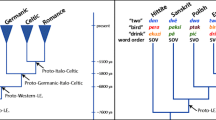Abstract
Many (including the author) argue that reading the classics in the field should be part of a scientist’s education. However, how you read the classics can be very different depending on whether you read them as a historian or as a practicing scientist. This point will be made by comparing two readings of Charles Darwin’s Origin of Species, and by looking at the use that Stephen Jay Gould made of the history of science in his quest to promote his scientific ideas.
Similar content being viewed by others
Notes
I am greatly indebted to the editor of this journal for help in identifying sources that insist on the importance of the history of science in science education. If a knowledgeable person accuses me of plagiarism in this first section, I can only reply “It’s a fair cop!”.
The condescending treatments of Darwin along these lines are legion. Look at Gertrude Himmelfarb’s Darwin and the Darwinian Revolution (1959).
Ernst Mayr is in the sights of both of them.
This is from the Critique of Pure Reason (first edition, A, 1781; second edition, B, 1787)
Intuition and concepts … constitute the elements of all our cognition, so that neither concepts without intuition corresponding to them in some way nor intuition without concepts can yield a cognition. Thoughts without [intensional] content (Inhalt) are empty (leer), intuitions without concepts are blind (blind). It is, therefore, just as necessary to make the mind's concepts sensible—that is, to add an object to them in intuition—as to make our intuitions understandable—that is, to bring them under concepts. These two powers, or capacities, cannot exchange their functions. The understanding can intuit nothing, the senses can think nothing. Only from their unification can cognition arise. (A50-51/B74-76).
References
Conant, J. B. (1945). General education in a free society: Report of the Harvard committee. Cambridge, MA: Harvard University Press.
Darwin, C. (1859). On the origin of species by means of natural selection, or the preservation of favoured races in the struggle for life. London: John Murray.
Galileo. (1953). Dialogue concerning the two chief world systems (S. Drake, Trans.). Berkeley: University of California Press.
Himmelfarb, G. (1959). Darwin and the Darwinian revolution. London: Chatto and Windus.
Holmyard, E. J. (1925). An elementary chemistry. London: Edward Arnold.
Lamarck, J. B. (1809). Philosophie zoologique. Paris: Dentu.
Lyell, C. (1830–1833). Principles of geology: Being an attempt to explain the former changes in the earth’s surface by reference to causes now in operation. London: John Murray.
Mach, E. (1886). On instruction in the classics and the sciences. Popular Scientific Lectures. E. Mach, 338-74. La Salle, IL: Open Court.
Mayr, E. (1982). The growth of biological thought: Diversity, evolution and inheritance. Cambridge, MA: Harvard University Press.
Reznick, D. N. (2009). The “Origin” then and now: An interpretive guide to the “Origin of Species”. Princeton, NJ: Princeton University Press.
Ruse, M. (Ed.). (2013). The Cambridge encyclopaedia of Darwin and evolution. Cambridge: Cambridge University Press.
Sober, E. (2010). Did Darwin write the Origin backwards? Philosophical essays on Darwin’s theory. Buffalo: Prometheus.
Watson, J. D., & Crick, F. H. C. (1953). Molecular structure of nucleic acids. Nature, 171, 737.
Author information
Authors and Affiliations
Corresponding author
Rights and permissions
About this article
Cite this article
Ruse, M. Teaching the Classics: The Origin of Species as a Case Study. Sci & Educ 22, 2255–2265 (2013). https://doi.org/10.1007/s11191-012-9547-4
Published:
Issue Date:
DOI: https://doi.org/10.1007/s11191-012-9547-4




